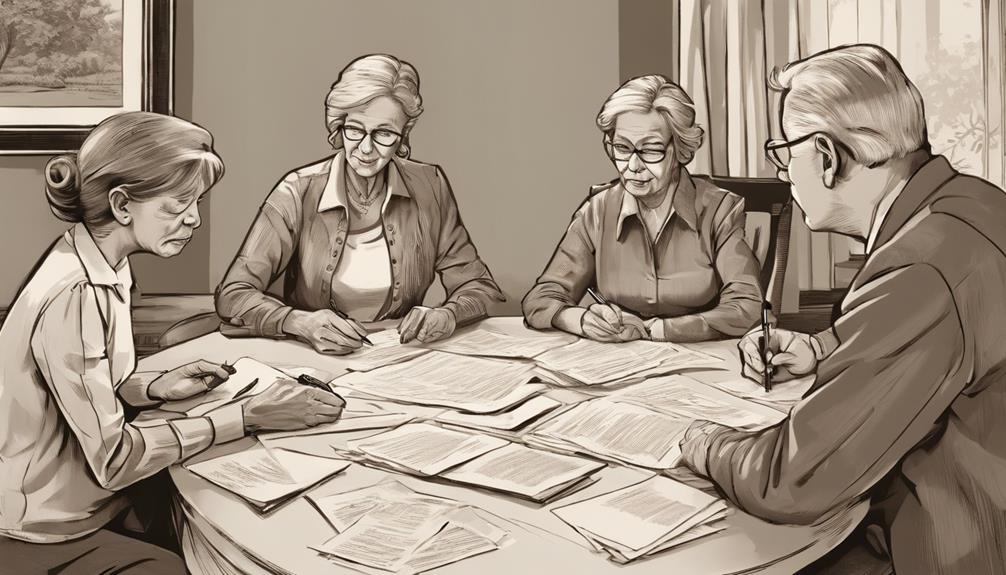Picture a meticulously maintained garden, where each plant needs specific care and attention to flourish. Similarly, looking after aging parents requires personalized approaches tailored to their unique needs.
As we navigate the intricate paths of caregiving, a wealth of knowledge and support awaits us. By uncovering these hidden gems, we can navigate this journey with more ease and grace, ensuring our loved ones receive the care they deserve.
Key Takeaways
- Prioritize active listening and empathy in communication.
- Enroll in emergency preparedness courses for valuable knowledge.
- Define clear duties and payment terms in caregiving contracts.
- Recognize signs of caregiver burnout and prioritize self-care.
Recognizing Signs of Aging Parents' Needs
As we observe our aging parents, it's crucial to pay attention to subtle signs such as missed social events, unpaid bills, or forgotten appointments to recognize their changing needs. These indicators could signify memory loss and other age-related challenges that may require adjustments in caregiving.
Before taking on all their needs solo, it's important to assess our parents' capabilities to ensure we're adequately prepared for potential emergencies. Common emergencies for aging parents include medical issues, falls, and caregiver stress-related health problems that may result in unexpected ER visits.
Enrolling in emergency preparedness courses can provide valuable knowledge on creating safe floor plans, handling emergencies effectively, and boosting confidence in caregiving tasks. By recognizing these signs early on and taking proactive steps to prepare for potential challenges, we can better support our aging parents and provide the care they need with compassion and understanding.
Overcoming Communication Challenges

Noticing signs of aging parents' changing needs can prompt us to enhance our communication strategies, fostering trust and understanding as we navigate potential challenges together. As caregivers, it's essential to employ effective communication strategies that prioritize active listening, empathy, and feedback. By actively listening to our elderly parents, we show them that their thoughts and feelings are valued, which can significantly strengthen our bond with them.
Enrolling in communication courses can further enhance our skills, providing us with the tools needed to navigate complex conversations with empathy and understanding. Additionally, utilizing user-friendly communication devices can facilitate smoother interactions, making it easier for us to stay connected and engaged with our aging parents. By approaching communication with empathy and a desire to understand, we can overcome challenges, bridge any gaps, and ultimately improve our relationships with our elderly parents.
Trust and strong communication are the foundations upon which we can build a supportive and loving environment for our aging loved ones.
Preparing for Emergency Situations
In times of uncertainty, it is crucial for families to proactively prepare for emergency situations when caring for elderly parents. Being equipped with the right knowledge and skills can make all the difference in ensuring the safety and well-being of our loved ones. Here are some essential aspects to consider when preparing for emergency situations:
| Aspect | Importance | Tips |
|---|---|---|
| Emergency Preparedness | Critical | Enroll in courses to handle unexpected situations effectively. |
| Safe Floor Plans | Vital | Learn about safe floor plans for quick responses in emergencies. |
| Lifesaving Skills | Essential | Gain knowledge in lifesaving skills for immediate action. |
| ER Visits | Preparedness | Have a plan in place for medical care, living situations, and daily expenses. |
| Readiness | Confidence | Enhance your confidence by being prepared for any emergency. |
Understanding Family Caregiving Contracts

Understanding Family Caregiving Contracts is a crucial step in ensuring clear expectations and responsibilities between caregivers and elderly parents are established. Family caregiving contracts serve as essential tools for formalizing the caregiving arrangement and setting the foundation for a harmonious caregiving relationship.
Here are some key points to consider when creating a family caregiving contract:
- Responsibilities: Clearly outline the duties and tasks expected from the caregiver to avoid any misunderstandings.
- Payment Terms: Define the payment terms, including compensation, reimbursement for expenses, and any provisions for caregiver compensation through life insurance policies.
- Legal Protection: Seek legal or financial advice to ensure that the contract provides legal protection for both parties involved.
- Boundaries: Establish boundaries to respect each other's personal space and privacy, fostering a healthy caregiving environment.
Managing Caregiver Stress and Burnout
Recognizing the signs of caregiver burnout is crucial for maintaining the well-being of those providing care to elderly parents. Caregiver stress affects a significant percentage of family caregivers, leading to burnout and various health issues. Symptoms of caregiver burnout may manifest as fatigue, anxiety, depression, and feelings of isolation.
To prevent burnout, respite care services offer temporary relief for caregivers, allowing them time to rest and recharge. Engaging in self-care practices such as exercise, relaxation techniques, and seeking support from others are vital strategies for managing caregiver stress effectively.
It's essential for family caregivers to prioritize their own well-being to continue providing quality care for their elderly parents. By recognizing the signs of burnout early on and seeking professional help when needed, caregivers can prevent long-term negative effects on their health. Remember, managing caregiver stress isn't a sign of weakness but a necessary step in ensuring both the caregivers' and their loved ones' overall well-being.
Frequently Asked Questions
How Do You Stay Sane While Caring for an Elderly Parent?
We stay sane while caring for elderly parents by prioritizing self-care. Setting boundaries, seeking support from caregiver communities, and engaging in hobbies help us manage stress effectively.
It's crucial to balance responsiveness with boundaries to protect our mental and physical health. Recognizing the importance of self-care maintains our sanity and ensures quality care for our loved ones.
What Happens if Elderly Person Has No One to Care for Them?
When an elderly person has no one to care for them, they face increased risks of neglect, isolation, and inadequate care. Untreated medical conditions, malnutrition, and mental health issues become more prevalent. Tasks like medication management and accessing healthcare can become overwhelming.
Seniors without support are susceptible to financial exploitation and safety hazards. Community resources, senior centers, and professional caregivers play crucial roles in providing necessary support for these vulnerable individuals.
How Do You Deal With a Difficult Mother Who Is Elderly?
Dealing with a difficult elderly mother requires empathy and patience. Understanding that her behavior may stem from fear, frustration, or health issues is crucial.
Seeking support from professionals or support groups can help manage the emotional toll. Setting boundaries and practicing self-care is essential for maintaining well-being.
Exploring therapy or counseling can provide coping strategies and improve communication. It's important to approach this situation with compassion and understanding.
What Is Burnout From Caring for Elderly Parents?
Caring for elderly parents can lead to burnout, a state of physical and emotional exhaustion from prolonged stress. Symptoms include fatigue, irritability, and feeling overwhelmed. It can affect both the caregiver and the care recipient.
Setting boundaries, seeking support, and prioritizing self-care are crucial. Recognizing early signs and taking proactive steps can help caregivers maintain well-being and provide effective care.
Conclusion
As we journey through the maze of caring for our elderly parents, let's remember to be the lighthouses guiding them through the stormy seas of aging.
With patience, understanding, and a compassionate heart, we can unlock the secrets to providing them with the comfort and support they deserve.
Together, we can navigate the twists and turns of caregiving, shining a beacon of love and care for our beloved parents.









